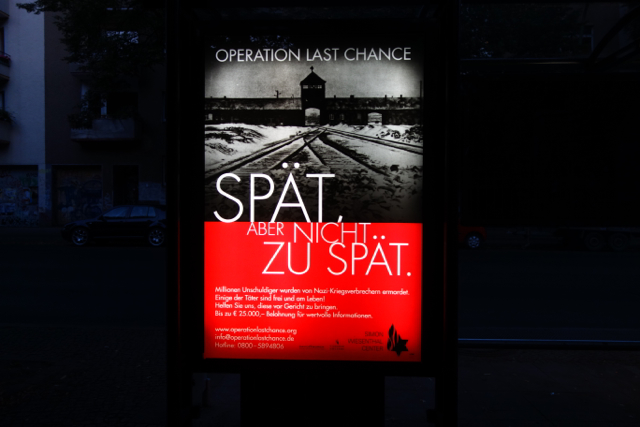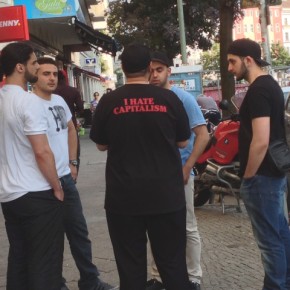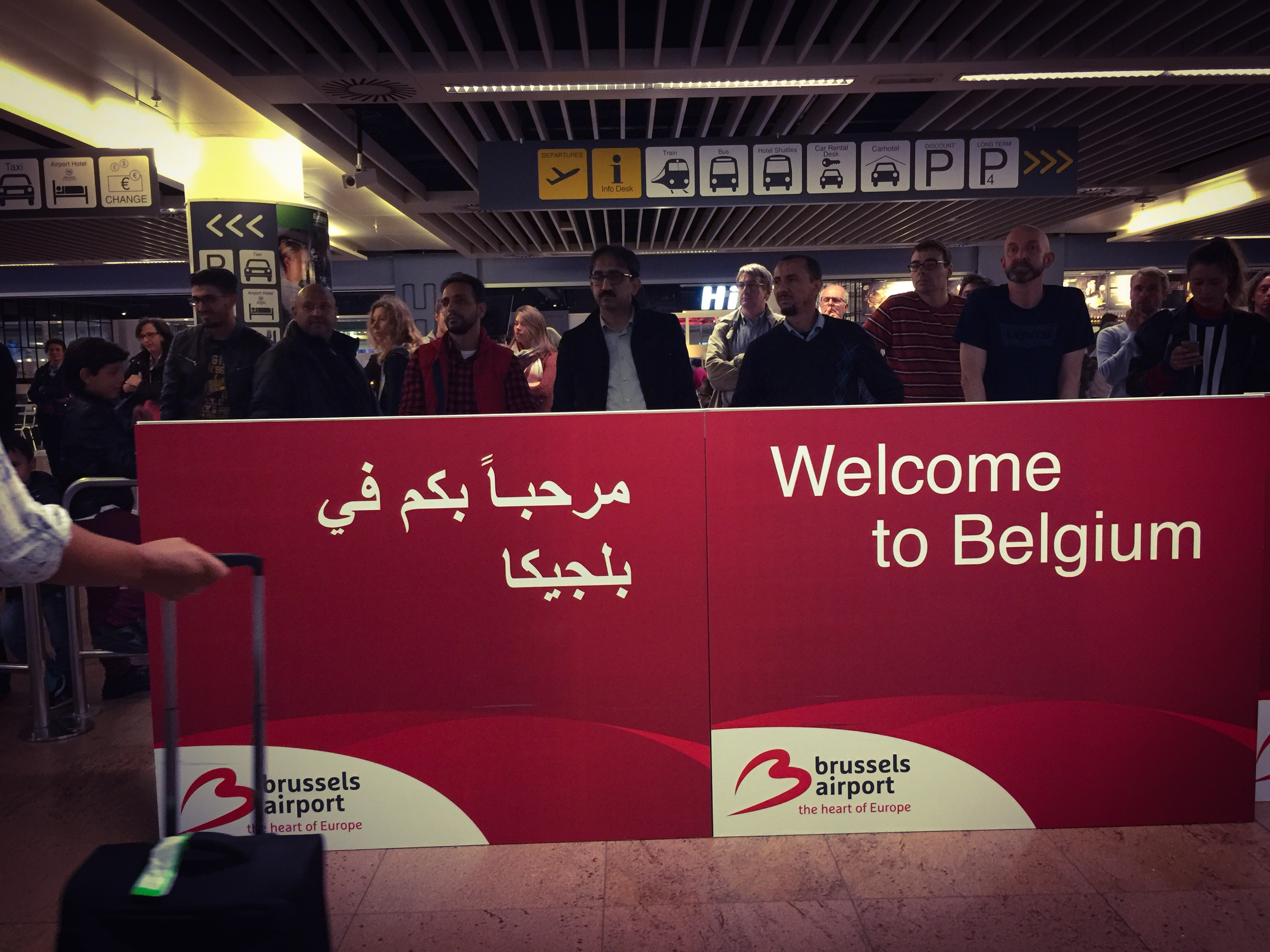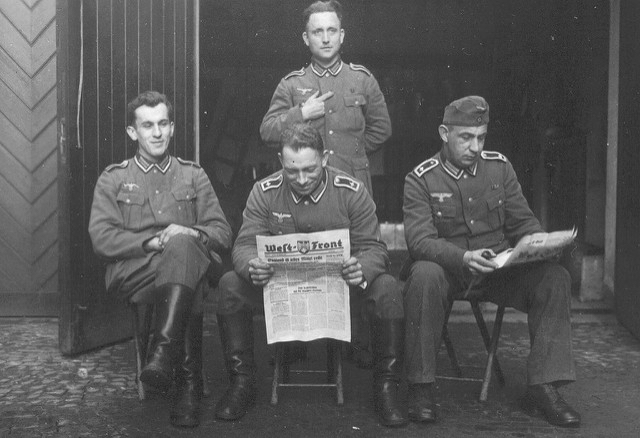You may have seen these posters plastered all over Germany. ‘Operation Last Chance’ is a witch hunt calling for all those who were Nazis and have yet gone unpunished. To be imprisoned and to rot. The organisation behind it says they have never met a Nazi who showed any remorse. This begs many questions. Is this true?
As a researcher and activist on war-trauma, what about the many young people I have met who have humbly shared their stories of their remorseful grandparents with me? And even if it were true, is imprisonment really the best use of resources? Will justice really prevail? Is the prison system really the height of the human imagination in dealing with trauma? Have you really been unpunished? Personally, mentally, culturally?
In ten years, there won’t be any Holocaust survivors or (ex) Nazi soldiers. How amazing it would be to meet and speak to you. Unlike the elder leaders of the Nazis, people like you, who were child soldiers at the time caught up in a tyrannical regime, where if you didn’t join, you would die. People like you, who have bittersweet wisdom to share with the world. Wisdom regarding complicity, guilt, trauma, overcoming and about the depth and breadth of humanity to hurt and love.
Instead of letting Omas and Opas rot in prison, can’t we use this knowledge and apply it to issues today? Would you share it? Like you probably, everyday I wake up and know that I’m complicit in someone’s misery somewhere. In the spirit of the post-war mantra ‘Never Again For Anyone’, I know I could be doing much more to stop genocides of today – whether that’s those affected by climate change, women raped and killed all over the world because of patriarchy or those in Palestine and Iraq at the hands of neo-colonialism or the increasing racist attacks on Turkish people in our own community. But, like you, that doesn’t make me evil, merely a pawn in a puzzle which we must all understand more deeply.
Whenever we are looking for the solution to a problem, such as inherited trauma, we must identify who has power. By power I mean influence and money. The answer is not for us to move further from one another, cowering in opposing fortresses constructed from vengeful words. We need now to move closer to one another, to understand one another. Once we build practices to build cultures that bring us back to love rather than hate – really love – then it becomes more difficult to believe the lies about the other. Their exploitation is harder to accept.
And once we start to question the stereotypes, it becomes easier, though not automatic, to question indoctrination as well. Today, if we can take anything heartening from the Nazi Holocaust, it’s the knowledge that we must transcend Fascism’s mob mentality, in order to prevent similar atrocities. With such knowledge in hand, descendants can look beyond the fear and chaos and attune instead to a higher code. One of integrity, solidarity and strength.
I know from experience that this is a very conflicting experience for so many. All four of my grandparents were Nazi Holocaust survivors and have been haunted ever since. My parents got together due to their similar backgrounds. Trauma squared. Being a Jew, a queer and a twin, if I was around at the time, Goebbels would have had a field day. I would have been triple doomed, if you know what I man. So I know the impact of your actions. Still, I don’t hate you.
If you’re thinking of nobly handing yourself in, please get in touch first. I’d love to listen and to learn from your journey before your wisdom is silenced forever. Long term changes happen only through listening and dialogue, not the tired and predictable model of punishment and retribution. Just as people hid my grandparents to protect their humanity, you’ll be safe here before you show your face.
Similarly, if you’re a Holocaust descendant of my generation and want to harness our ancestors knowledge and stop genocides today, get in touch. I live in Sudstern, Berlin. My phone number is 01799579275 and my email address is alright@theglassishalffull.co.uk. Operation Last Chance raises all these questions, which I have no particular answer for. It’s not only the last chance for your tribulations, but also for the whole world to learn. I’d love to hear your thoughts.
As Albert Einstein once said, ‘We can’t solve problems by using the same kind of thinking we used when we created them.’

ADDENDUM
Never Again For Anyone:
What have we gained from the Nazi Holocaust 70 years on?
Would you be interested in a developing programme about trauma and emancipation in relation to current generation Nazi Holocaust survivors – the grandchildren of Holocaust survivors? Would you like to support it through contacts, your involvement, money, and ideas?
The process entails building a programme amongst a diverse range of Nazi Holocaust descendants – including Gypsies/Roma, Nazis, liberators, Jews and others. Based in key cities across Europe, the programme hopes to create understanding as to the continuing effects of Holocaust trauma, and the return of nationalist extremism to the continent. This is intended to build until 2015, the 70th anniversary of the official ‘ending’ of the Nazi Holocaust, to help make meaningful these issues.
This is an important and timely issue for four major reasons. Firstly, 2013 marks the 80th anniversary of Adolf Hitler’s rise to power. Secondly, we’re witnessing a resurgence of neo-Nazism. Thirdly, as grandchildren of Holocaust survivors, we would like to explore issues surrounding inherited Holocaust trauma and its internalisation and/ or externalisation. Lastly, the transferral of trauma experience from the Nazi Holocaust, for use for community empowerment in modern-day injustices.
It may sound strange, but third generation descendants have a lot to share with the world in terms of transferring issues of justice and liberation to struggles around the world today. Hope, self-reliance and the link between memory and action are just some of these nuggets of wisdom, which may allow us to understand conditions which allow for fascism, as well as fight it. Ultimately, the programme provides critical space for reflection, because if we don’t know our history, we’re in danger of repeating it.
So, how can the sharing of traumas become a tool for greater development, a subversive activism that declares a people’s refusal to live numb and small? How is this sense of living connection being maintained and perpetuated, even as the generation of survivors leaves our midst and how? How can we best carry their stories forward without appropriating them, without unduly calling attention to ourselves, and without, in turn, having our stories displaced by them? In the spirit of the post-Holocaust United Nations statement ‘Never Again for Anyone’, can the third generation transform our cultural inheritance from shame into justice and pride for others?
Photographs courtesy of Joel Schalit





